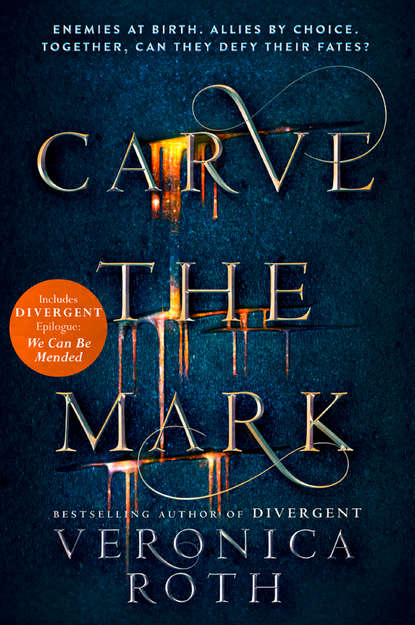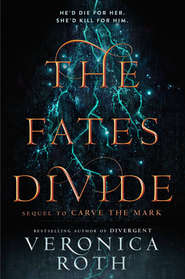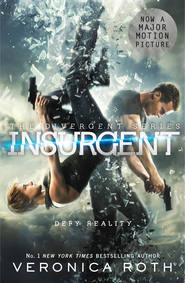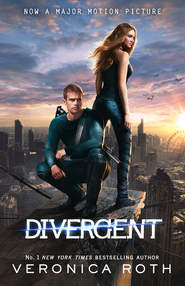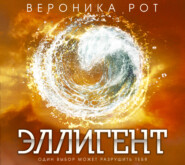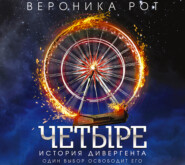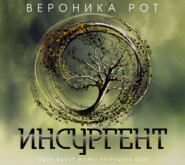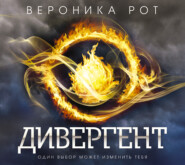По всем вопросам обращайтесь на: info@litportal.ru
(©) 2003-2025.
✖
Carve the Mark
Настройки чтения
Размер шрифта
Высота строк
Поля
“Well, we seek renewal above all else,” she said. “And we find what is to be made new in what has been discarded. Nothing worthwhile should ever be wasted. Surely we can agree on that.”
And then her words were playing backward, and the goggles were lifting up to my eyes, then over my head, and into the man’s hand again. It was my first scavenge, and it was unwinding, unraveling in my mind. After the memory played backward, it was gone.
I was back in my bedroom, with the figurines surrounding me, and I knew that I had had a first sojourn, and that we had met the leader of Zoldia City, but I could no longer bring the images to mind. In their place was the prisoner with the cord around his throat, and Father’s low tones in my ear.
Ryz had traded one of his memories for one of mine.
I had seen him do it before, once to Vas, his friend and steward, and once to my mother. Each time he had come back from a meeting with my father looking like he had been shredded to pieces. Then he had put a hand on his oldest friend, or on our mother, and a moment later, he had straightened, dry-eyed, looking stronger than before. And they had looked … emptier, somehow. Like they had lost something.
“Cyra,” Ryz said. Tears stained his cheeks. “It’s only fair. It’s only fair that we should share this burden.”
He reached for me again. Something deep inside me burned. As his hand found my cheek, dark, inky veins spread beneath my skin like many-legged insects, like webs of shadow. They moved, crawling up my arms, bringing heat to my face. And pain.
I screamed, louder than I had ever screamed in my life, and Ryz’s voice joined mine, almost in harmony. The dark veins had brought pain; the darkness was pain, and I was made of it, I was pain itself.
He yanked his hand away, but the skin-shadows and the agony stayed, my currentgift beckoned forward too soon.
My mother ran into the room, her shirt only half buttoned, her face dripping from washing without drying. She saw the black stains on my skin and ran to me, setting her hands on my arms for just a moment before yanking them back, flinching. She had felt the pain, too. I screamed again, and clawed at the black webs with my fingernails.
My mother had to drug me to calm me down.
Never one to bear pain well, Ryz didn’t lay a hand on me again, not if he could help it. And neither did anyone else.
(#ulink_557fdbda-154e-5804-bc7d-6875fee341f5)
“WHERE ARE WE GOING?”
I chased my mother through the polished hallways, the floors gleaming with my dark-streaked reflection. Ahead of me, she was holding her skirts, her spine straight. She always looked elegant, my mother. She wore dresses with plates from an Armored One built into the bodices, draped with fabric so they still looked light as air. She knew how to draw a perfect line on her eyelid that made it look like she had long eyelashes at each corner. I had tried to do that once, but I hadn’t been able to keep my hand steady long enough to draw the line, and I had to stop every few seconds to gasp through pain. Now I favored simplicity over elegance, loose shifts and shoes without laces, pants that didn’t require buttoning and sweaters that covered most of my skin. I was almost nine seasons old, and already stripped of frivolities.
The pain was just part of life now. Simple tasks took twice as long because I had to pause for breath. People no longer touched me, so I had to do everything myself. I tried feeble medicines and potions from other planets in the vain hope they would suppress my gift, and they always made me sick.
“Quiet,” my mother said, touching her finger to her lips. She opened a door, and we walked onto the landing pad on the roof of Noavek manor. There was a transport vessel perched there like a bird resting midflight, its loading doors open for us. She looked around once, then grabbed my shoulder—covered with fabric, so I didn’t hurt her—and pulled me toward the ship.
Once we were inside, she sat me down in one of the flight seats and pulled the straps tight across my lap and chest.
“We’re going to see someone who might be able to help you,” she said.
The sign on the specialist’s door said Dr. Dax Fadlan, but he told me to call him Dax. I called him Dr. Fadlan. My parents had raised me to show respect to people who had power over me.
My mother was tall, with a long neck that tilted forward, like she was always bowing. Right now the tendons stood out from her throat, and I could see her pulse there, fluttering just at the surface of her skin.
Dr. Fadlan’s eyes kept drifting to my mother’s arm. She had her kill marks exposed, and even they looked beautiful, not brutal, each line straight, all at even intervals. I didn’t think Dr. Fadlan, an Othyrian, saw many Shotet in his offices.
It was an odd place. When I arrived, they put me in a room with a bunch of unfamiliar toys, and I played with some of the small figurines the way Ryzek and I had at home, when we still played together: I lined them up like an army, and marched them into battle against the giant, squashy animal in the corner of the room. After about an hour Dr. Fadlan had told me to come out, that he had finished his assessment. Only I hadn’t done anything yet.
“Eight seasons is a little young, of course, but Cyra isn’t the youngest child I’ve seen develop a gift,” Dr. Fadlan said to my mother. The pain surged, and I tried to breathe through it as they told Shotet soldiers to when they had to get a wound stitched and there was no time for a numbing agent. I had seen recordings of it. “Usually it happens in extreme circumstances, as a protective measure. Do you have any idea what those circumstances might have been? They may give us an insight into why this particular gift developed.”
“I told you,” my mother said. “I don’t know.”
She was lying. I had told her what Ryzek did to me, but I knew better than to contradict her now. When my mother lied, it was always for a good reason.
“Well, I’m sorry to tell you that Cyra is not simply growing into her gift,” Dr. Fadlan said. “This appears to be its full manifestation. And the implications of that are somewhat disturbing.”
“What do you mean?” I didn’t think my mother could sit up any straighter, and then she did.
“The current flows through every one of us,” Dr. Fadlan said gently. “And like liquid metal flowing into a mold, it takes a different shape in each of us, showing itself in a different way. As a person develops, those changes can alter the mold the current flows through, so the gift can also shift—but people don’t generally change on such a fundamental level.”
Dr. Fadlan had an unmarked arm, and he did not speak the revelatory tongue. There were deep lines around his mouth and eyes, and they grew even deeper as he looked at me. His skin was the same shade as my mother’s, however, suggesting a common lineage. Many Shotet had mixed blood, so it wasn’t surprising—my own skin was a medium brown, almost golden in certain lights.
“That your daughter’s gift causes her to invite pain into herself, and project pain into others, suggests something about what’s going on inside her,” Dr. Fadlan said. “It would take further study to know exactly what that is. But a cursory assessment says that on some level, she feels she deserves it. And she feels others deserve it as well.”
“You’re saying this gift is my daughter’s fault?” The pulse in my mother’s throat moved faster. “That she wants to be this way?”
Dr. Fadlan leaned forward and looked directly at me. “Cyra, the gift comes from you. If you change, the gift will, too.”
My mother stood. “She is a child. This is not her fault, and it’s not what she wants for herself. I’m sorry that we wasted our time here. Cyra.”
She held out her gloved hand, and wincing, I took it. I wasn’t used to seeing her so agitated. It made all the shadows under my skin move faster.
“As you can see,” Dr. Fadlan said, “it gets worse when she’s emotional.”
“Quiet,” my mother snapped. “I won’t have you poisoning her mind any more than you already have.”
“With a family like yours, my fear is that she has already seen too much for her mind to be saved,” he retorted as we left the room.
My mother rushed us through the hallways to the loading bay. By the time we reached the landing pad, there were Othyrian soldiers surrounding our vessel. Their weapons looked feeble to me, slim rods with dark current wrapped around them, set to stun instead of kill. Their armor, too, was pathetic, made of pillowed synthetic material that left their sides exposed.
My mother ordered me into the ship, and paused to speak with one of them. I dawdled on my way to the door to hear what they said.
“We are here to escort you off-world,” the soldier said.
“I am the wife of the sovereign of Shotet. You should address me as ‘my lady,’” my mother snapped.
“My apologies, ma’am, but the Assembly of Nine Planets recognizes no Shotet nation, and therefore no sovereign. If you leave the planet immediately, we will cause you no trouble.”
“No Shotet nation.” My mother laughed a little. “A time will come when you will wish you hadn’t said that.”
She clutched her skirts to lift them, and marched into the ship. I scrambled inside and found my seat, and she sat beside me. The door closed behind us, and ahead of us, the pilot gave the signal for liftoff. This time I pulled the straps across my own chest and lap, because my mother’s hands were shaking too badly to do it for me.
I didn’t know it at the time, of course, but that was the last season I had with her. She passed away after the next sojourn, when I was nine.
We burned a pyre for her in the center of the city of Voa, but the sojourn ship carried her ashes into space. As our family grieved, the people of Shotet grieved along with us.
Ylira Noavek will sojourn forever after the current, the priest said as the ashes launched behind us. It will carry her on a path of wonder.
For seasons afterward, I couldn’t even speak her name. After all, it was my fault she was gone.
(#ulink_ba792f4c-e36a-5ee8-951b-9a77be75836e)





